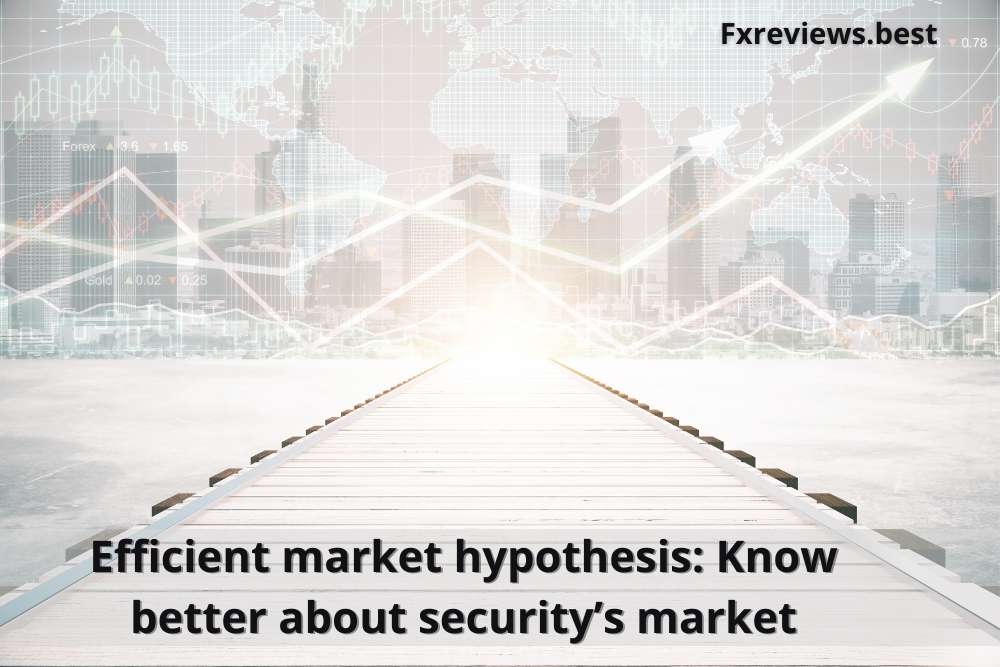The efficient market hypothesis is also called an efficient market theory. It exhibits that a security’s price exhibits all known and relevant information about that underlying asset. Thus, as per the phenomenon, a trader cannot consistently beat the financial market, generally on a risk-adjusted basis.
However, some people call the theory controversial, which may have major implications during investment strategy. Moreover, it signifies that share prices reflect consistent alpha generation.
As per EMH, stocks have a tendency to trade fairly on exchanges as far as value is concerned. Thus, investors or traders can’t sell stocks at inflated rates and buy undervalued stocks.
Hence, there’s no possibility of outsmarting the market via market timing or an expert market selection. Instead, one may have to indulge in perilous investments for maximum benefits.
What is the Efficient market hypothesis?
In financial economics, the efficient market hypothesis says that all available information gets reflected by the price of an asset. Thus, it explains about the modus operandi of the securities market. Also, it is considered as modern financial theory’s cornerstone.
EMH is quite disputed and highly controversial. Some people argue that it does not make any sense to predict trends or search for undervalued stocks in the financial market through technical or fundamental analysis.
Meanwhile, fundamental and technical analyses are unable to produce risk-adjusted returns theoretically. However, as per the theory, the market rates comfortably reflect the value of underlying assets. It also includes intangible assets, liabilities, hard assets, and company’s cash.
As per some believers, the outsized risk adjustment returns can be resulted from only inside information. However, on the other side, there are several academics who support EMH with shreds of evidence. For instance, an astute and one of the biggest investors Warren Buffet has always beaten the market. But that’s not possible as per EMH.
Even in 1987, during the stock market crash, DJIA fell more than 20 per cent in a single day. So, stock prices deviated from their fair values. It burst another belief.
Additionally, it can be understood by another illustration. Suppose a company releases 2 million shares at USD 5 per share. As per the efficient market, the worth of the company is USD 10 million while calculating its total holdings, including a realistic projection of its growth in the future and debts. If shares fall to USD 3, investors will have some incentive to hold their shares or even purchase more than the market’s will.
Moreover, it will soon reflect the actual market value of USD 5. It puts down the view that the market does not work efficiently. It means the price of the security will reflect elements other than its underlying assets’ value. The behavior of the inefficient market is more like a casino, with traders selling and buying stocks based on how other investors or traders perceive them or reach, more than an analysis.
In the inefficient market, if the company’s shares climb to USD 10, it would reflect that investors are purchasing the shares only because other traders may pay USD 15 for them later on. Thus, no question of shares being at fair value arises here.
Inefficient markets are set to create bubbles. For instance, if the company shares fall to USD 12 from USD 15, an investor would be encouraged to sell them. It is because shares had moved enough from their original or true value. The investor is not in the position to anticipate either dividends or future gains for offsetting the price of the share paid by them.
It offers reasons for instability.
Important considerations
As per efficient market hypothesis’ proponents, that it is better to invest in a passive low-cost portfolio due to the market’s randomness. Passive funds get outperformed by active managers at some point. Investors have a challenge in their hands which one would do that in the long-term. Interestingly, fewer than 25 per cent of the best-performing active managers have the ability to outperform their counterpart passive managers over time.
What does efficient market theory mean?
As per the efficient market hypothesis, the market operates effectively because all public information is provided at the rates of any given asset and at any time. It means an investor cannot get ahead in the market by trading using the latest information because all traders are using the same thing.
One must note that efficient market theory does not guarantee or argue whether the market would get right at any certain moment. Markets can overvalue or undervalue any asset.
Additionally, if the asset strays too far from the actual value, the market would take charge of correcting the mistake.
What things can make the market more efficient?
The effectiveness of the efficient market hypothesis depends on the involvement of an increased number of traders or participants. The diversified information is helpful. As the market becomes excessively liquid and active, arbitrageurs will also grow simultaneously. They’ll ensure profits by correcting small inefficiencies whenever it arises. Moreover, it quickly restores efficiency.
Can the market be inefficient?
Some markets are good too, and the rest are inefficient. So there’s a balance that the market is maintaining. An inefficient market is one whose assets’ price does not reflect the correct value. It may occur for many reasons. The market’s inefficiency may exist following the information asymmetries, human emotion, market psychology, delays, transactions costs, and other reasons.
Moreover, in reality, some markets showcase some level of inefficiency, which may lead to deadweight losses.
Qualifying the EMH
Eugene Fama, the founder of the term EMH, never thought that his efficient market would be a hundred per cent accurate every time. That cannot be possible because it will take some time for the information to reach the stocks, and the stock will react afterward. That’s what the Fama efficient market hypothesis is all about.
However, there’s no strict or particular definition of how much time rates need to get back to their fair values. Moreover, random events are acceptable under an efficient market. But once the prices reach normal, they will be chickened out.
Meanwhile, it’s a valid question to ask whether EMH undervalues itself by allowing environmental eventualities. ]These eventualities must be taken into consideration under market efficiency undoubtedly. Theoretically, prices should respond immediately once new information gets released.
There’s a possibility that it may affect the investment characteristics of stocks. Thus, if EMH provides an inefficiency, it is liable to admit the market inefficiency is there or possible.
Notably, despite the increasing usage of computers, decision-making rests entirely on human beings. Hence, that is subject to human error.
Even analytical machines are becoming universal. So the success in the stock market entirely depends on the skill of a trader. Unfortunately, however, several traders still look for shortcuts that may not work for them.
They want bigger returns than the actual market average.
Issues with EMH
The effective market hypothesis feels all traders perceive all available knowledge in exactly the same way. The different methods for valuing and analyzing stocks issue the validity of the EMH.
Suppose one trader looks for undervalued market chances, while the other evaluates them on the basis of potential. Both traders will come at a distinct growth.
Thus, there is another argument that since different investors or traders value stock in a distinct way, it is difficult to determine the actual worth of stock under an efficient market.
Different forms of efficient market hypothesis
Semi strong:-
The market exhibits publicly available data at any point in time. It includes business fundamentals and historical trading information. On the other side, an investor can bargain advantage via private data or through limited information.
Strong:-
The market offers all relevant information at any given time, private and public. As a result, there are situations where traders might get unusual gains. They can be higher or lower, depending on the market. Also, it can happen following short-term inefficiencies. It is not possible for any trader to make consistent advantages over the other.
Weak:-
The market exhibits all historical data for stock prices. So, as per this theory, there’s no way an investor can capture gains through technical analysis. Moreover, every trader has access to a similar set of data, and they price their positions into that.
Conclusion:
As per the efficient market hypothesis, the financial market does not guarantee perfect efficiency. And if it does, there are several conditions applied to the theory. One of them is the absence of human emotions that may result in the fluctuating market as the decision-making never arrives on point. Moreover, if all market participants accept that their profits and losses would be similar to the other investors, one can see the perfect efficiency.
Brokers like PrimeFin, and others offer opportunities to understand efficient market hypotheses.



